
You need to find your starting line before beginning your learning journey.
Have you ever seen the level of a language course expressed as A1, B2 or C1? These ratings refer to the Common European Framework of Reference for Languages, also known as CEFR. In this article, we’ll talk about how you can use your CEFR score to estimate how much time you will need to invest until you’ve mastered English up to the level you want to achieve.
But first of all, what exactly is CEFR?
What is CEFR, exactly?
Every language has their own rating system for level testing, such as IELTS or TOEFL for English, TOPIK for Korean, HSK for Chinese.
CEFR is also a rating system, but it applies across all languages. It simply describes what you can do in any particular language. The framework was invented by the Council of Europe specifically to compare how well someone has mastered any language.
In the case of English, you can convert your CEFR score into TOEFL or IELTS scores. More about that later.

The 6 CEFR levels: from A1 to C2
Before we go into how much time it takes to go from one CEFR level to the next, let’s talk about what the CEFR level names actually mean.
The levels starting with A are beginner levels, with A1 the first level you can attain when starting as an absolute beginner. The B levels describe intermediate learners, while the C levels are for advanced speakers of the language. Below are the simplified descriptions of the levels, taken from an original table that you can find on the Council of Europe website.
| Level | If you are at this level, you can … |
| C2 |
|
| C1 |
|
| B2 |
|
| B1 |
|
| A2 |
|
| A1 |
|
Most people aim to reach a B2 level first. This will give you an in-the-middle proficiency level in speaking, writing and reading.
But of course, it all depends on how good your English already is and where you plan to go. B2 level will be enough to travel in English speaking countries comfortably, but if you plan to pursue a career as a lawyer in an English speaking environment, you’ll need to push further.
Estimating required study time with CEFR
Now, the great thing about CEFR is that if you know your current level and the level you want to attain, you can use it to estimate the number of hours you’ll need to invest in English study.
If you’re reading this, you may already know your English level. If not, you can make use of our free placement test – it takes about 15 minutes or convert it from your IELTS, TOEFL or WPLN score (more about that later).
If you want to improve your English, it’s great to know where you started. And if you know your target CEFR level, we can estimate how long it will take you to get there.
| A1 (Beginner) | A2 (Elementary) |
| B1 (Pre-Intermediate) | B2 (Intermediate) |
| C1 (Upper-Intermediate) | C2 (Advanced) |
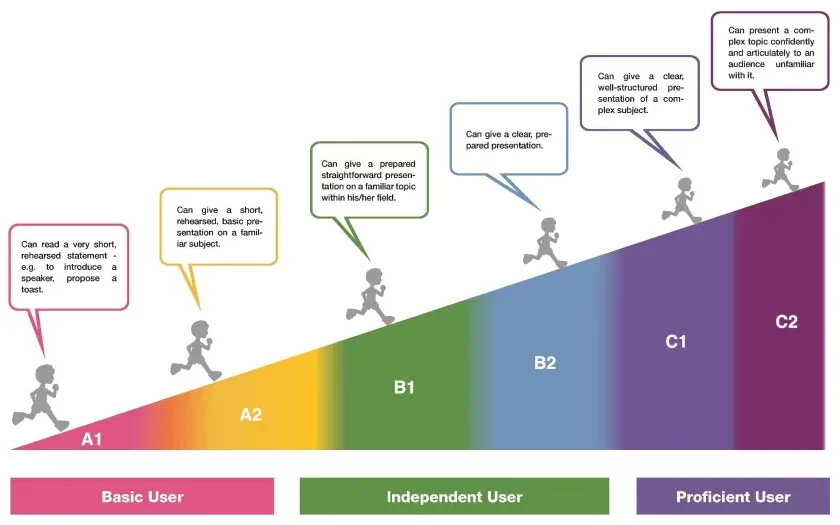
You will need to spend a good amount of time to advance from one level to the next. Time spent can be split into 3 components:

Class time

Revision

Practice
When we say you need an estimated 300 hours to advance to the next English CEFR level, this translates to 160 – 120 hours of class time, with the remainder consisting of regular practice and revision.
From CEFR A1 to A2
To break through from the A1 CEFR level to A2, you will need at least 300 hours.
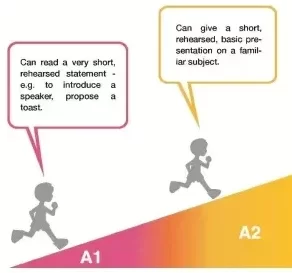
From CEFR A2 to B1
Congratulations!
You only need around 150 – 200 hours to reach B1 Pre-Intermediate Level.
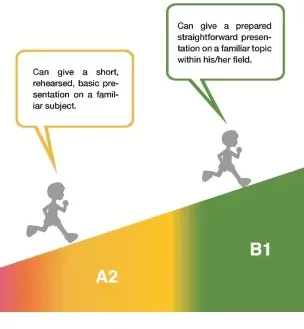
From CEFR B1 to B2
At the B1 CEFR level, you can speak, read and write, but with glaring grammatical errors. You won’t sound professional, but it is good enough for you to get by. People at this level are often stuck in a rut.
It would seem impossible to progress, but everyone can advance to the next level with the right mindset and training. You will need between 200 to 300 hours to reach B2 level.
Over the years, we have helped many of our Intermediate level students to progress further, so yes, you can do it!
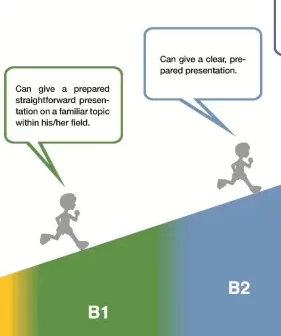
From B2 to C1
When you’ve reached B2 level, your English level is already quite close to that of a native speaker. You can speak confidently in various situations and can write well.
Students at this level who want to push their English further usually attend specialised courses to work on a specific area they wish to hone. Such as pronunciation, email writing or presentation skills.
We run regular courses for B2 level students. To level up from B2 to C1, you need to put in about a total of about 200 hours of work.
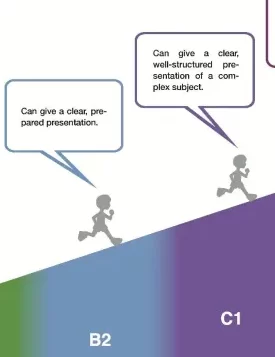
From C1 to C2
If you’re at C1 level and wish to achieve C2 level English proficiency, you need to count on another 200 hours of study time.
At this level, it’s even more common that you have a specific goal in mind. Feel free to reach out to us on WhatsApp to discuss your goals and how we can help you achieve them.
Converting between CEFR score and IELTS / TOEFL / PTE
Whichever test you have taken or are planning to take, know that they are just a way to test and prove your English level. A proven test score may be required for immigration or to gain admission in a university. If you don’t need to show a test score some time soon for this kind of purpose, there is no need to take a test.
You can just take our free placement test to get a good idea of your English level. With that score in hand, we (and any language school) will have a good idea of where to place you.
If you already took a test and know your level, you can use your TOEFL / IELTS / PTE score to estimate your CEFR level with the tool below. And vice versa, if you know you need to hit a certain IELTS band score and you’ve done our placement test, you’ll be able to find out how much study time you should plan for (if any).
Click on each button to show your target CEFR English level before attempting the test.
For e.g. if you require IELTS band 5, your current level should be B2.
| CEFR Level | Proficiency | IELTS Band |
| A1 | Beginner | 2.0 |
| A2 | Elementary | 3.0 |
| B1 | Pre-Intermediate | 4.0-4.5 |
| B2 | Intermediate | 5.0-6.0 |
| C1 | Upper-Intermediate | 7-8 |
| C2 | Advanced | 8.5-9 |
| CEFR Level | Proficiency | TOEFL Score |
| A1 | Beginner | 19-29 |
| A2 | Elementary | 30-40 |
| B1 | Pre-Intermediate | 41-64 |
| B2 | Intermediate | 65-93 |
| C1 | Upper-Intermediate | 94-114 |
| C2 | Advanced | 115-120 |
| CEFR Level | Proficiency | PTE Score |
| A1 | Beginner | 0-30 |
| A2 | Elementary | 31-42 |
| B1 | Pre-Intermediate | 43-58 |
| B2 | Intermediate | 59-75 |
| C1 | Upper-Intermediate | 76-84 |
| C2 | Advanced | 85-90 |
Before you take the test, know your target IELTS band/PTE score/TOEFL score and then compare it to your current level.
If your current level is below the IELTS band/PTE score/TOEFL score, scroll upwards to read about how many hours you will need to learn before you go for the test.
If your level is already sufficient, all you really need to do is to get familiar with the test format. Some 10-20 hours of prep before you go for the test should be enough to hit the level you aim for.
To sum it up
CEFR is a way to express proficiency in a language that works across languages. It simply describes what you can do in a particular language so that you can actually say “My English is better than your Mandarin”.
More importantly, many language schools, including us, use CEFR levels to build their curriculum. When you know your current and target CEFR level, you’ll know:
- Which course is suitable for your level
- How much time and effort it will take
- Which TOEFL / IELTS / PTE scores are realistic to aim for
At English Express and other Crystal Learning language schools, we see language, first of all, as a tool.
Every small improvement makes a difference immediately. You may never be perfect, and that’s ok. Even native speakers make mistakes. But as you become more confident in your ability to communicate in English, you’ll see the benefits.
We strongly believe that confidence is built through doing. That’s why our teachers will always encourage you to take the next step. Speak out, and try to speak out faster.
Practice and application are more important. To improve your conversational skills in English, you need to “do more” and “understand less”. That’s why we focus on practical topics that you can apply at the office the next day.
Ready to start?
Take our English level test
Completely free
